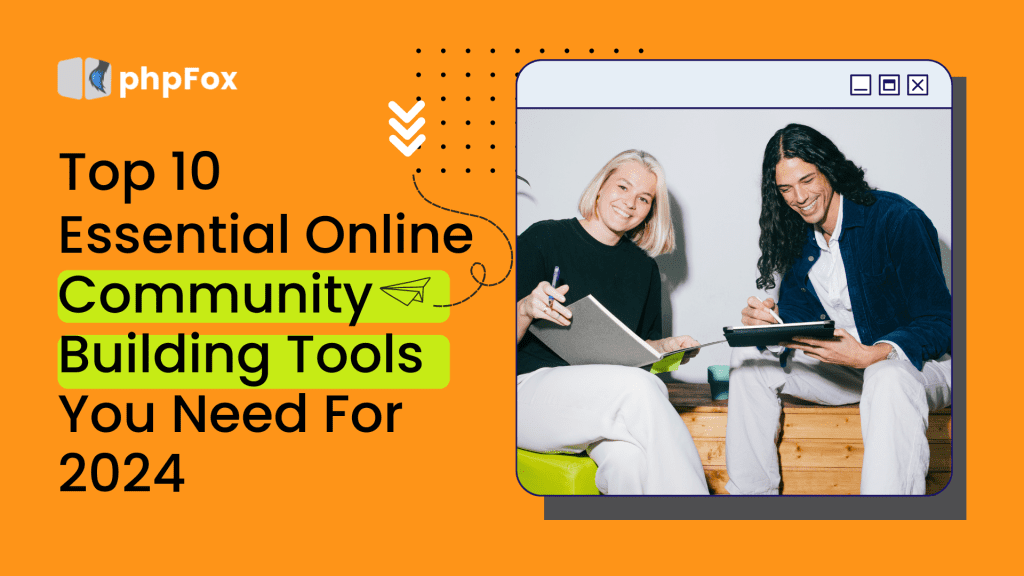
In the digital age, the power of community has never been more pronounced. As we navigate the vast expanse of the internet, it’s the communities we build and engage with that often become our compass, guiding us through the myriad of content and connections. For any platform looking to foster a vibrant and engaged user base, the right set of tools is essential. These tools not only bring people together but also empower them to share, collaborate, and grow in unison.
In this article, we’re talking about the Top 10 Essential Features and Tools for Building Online Communities in 2024 that are worth a try. We’ve mixed the list pretty evenly between the 5 features that an online community platform should give you, followed by 5 actual software options that are worth checking out. Whether you’re starting a new platform or looking to enhance an existing one, these tools will help you lay the foundation for a thriving online community. Let’s explore how they can transform the way your users interact, engage, and connect.
Top 5 Essential Features for Building Online Community
1. Live Streaming
Live streaming is quickly becoming an essential tool for community Hosts who want to connect more deeply with their members. This dynamic feature adds a unique layer of spontaneity and authenticity to your group’s interactions. Members appreciate live streaming because it brings a real-time, unfiltered experience that is often missing in pre-recorded content.

Integrating live streaming into your community platform can significantly enhance engagement. It allows for immediate feedback, real-time discussions, and a shared experience that can bring members closer together. Whether it’s hosting Q&A sessions, live tutorials, or spontaneous chats, live streaming can transform the way you connect with your community, making it an indispensable tool for any platform aiming to build a vibrant, engaged community.
The ability to livestream is an online community-building feature you need.
2. Forum
Discussion forums are one of the original online community-building features. In the early days of the internet, logging into chat rooms or discussion forums and connecting with people from around the globe was a thrilling experience. It was a simpler time when these text-based forums were enough to ignite our excitement for meeting new people.
Even today, discussion forums remain an essential feature for almost every online community. Most community platforms include them because they are fundamental to organizing discussions. Unlike real-time chats, forums allow conversations to unfold over days, weeks, and even years, providing a space for deeper, more thoughtful exchanges.
When choosing a discussion forum for your community, look for features like excellent usability and clean organization. It’s also beneficial to have options for multimedia—such as video, GIFs, and emojis—to make discussions more engaging and fun.
3. Direct Chat
Beyond forums, having the ability to take conversations to direct messages (DMs) or group chats is essential. Direct chat is a great tool for community Hosts because it lets you send important information directly to members, ensuring they see it. It also allows you to answer questions that people might not feel comfortable posting in the main forum.

For members, direct chat offers a chance to get to know each other more privately than in the public forum. This feature helps build real friendships and strengthens your community.
In summary, direct chat is a crucial feature that enhances communication and connection within your community.
4. Story
The story feature has become a popular tool for building online communities, and for good reason. Stories allow members to share brief, engaging content that disappears after a set period, typically 24 hours. This feature, initially popularized by social media platforms like Instagram and Snapchat, has proven to be a powerful way to keep community members connected and engaged.

Stories are perfect for sharing quick updates, behind-the-scenes moments, or personal insights. Using the story feature, members can share photos, videos, text, and even interactive elements like polls or questions. This variety allows for creative expression and interaction, making the community feel more vibrant and alive.
When integrating a story feature into your community platform, look for options that support multimedia content and provide easy-to-use editing tools. This will enable members to create appealing and engaging stories effortlessly.
5. Branded App
You need an app. In today’s world, everyone uses an app for almost everything. Your community members should be able to access your community through an app as well.
Your community-building platform should include a white-label mobile app. This means the app can be branded to look and feel like your own, with your logo, colors, and design. A white-label mobile app makes it easy for members to stay connected and engaged with your community, no matter where they are. They can participate in discussions, watch live streams, share stories, and more—all from the convenience of their mobile device.
Top 5 Software for Building Online Communities
Above we talked about the tools you need to build a community. Here we’re going to cover some of the software options for online community-building tools. You definitely don’t need all of these, in most cases only one or two will suffice!
6. phpFox
phpFox is an all-in-one community platform that lets you do everything we talked about above. phpFox stands out as an powerful place to host your online community, run live events and live streams, and build a thriving business. While you can look at some of the software options below as add-ons, you can easily launch your community and make it profitable with phpFox alone.
And if you’d like to try phpFox, you can check it out free for 14 days! It’s a great place to start, and you can get a feel for how to make your online community better. No credit card is required to sign up.
7. Patreon
If you’re thinking about ways to support your online community without an entry fee, consider pairing up with Patreon. It’s a platform where your members can choose to support you financially as patrons instead of regular paying members. Plus, you can offer access to your community as a special perk for your patrons.
For creators eager to make money from their audience, starting with a platform like phpFox might be a better choice than Patreon. It’s designed to help you build and manage your community effectively from the start.
8. Convert Kit
ConvertKit is a handy tool that helps you create sign-up pages to increase your email list. It’s like having a smart assistant that organizes your subscribers into groups, sends emails automatically, and does much more. It’s an ideal choice for managing your community’s email list with ease.
9. Facebook Group
Facebook Group are limited as a tool for online community building, but some people choose to start with them because they’re free and easily accessible. While you might struggle to keep momentum and fight the algorithm, if you’re not ready to invest in a dedicated community platform yet this might be a place to begin.
10. Google Analytics
Think of Google Analytics as a tool not just for counting website visitors, but also for keeping an eye on your community’s activity. If you’re using phpFox and have a business plan, you can connect it with Google Analytics. This lets you see where people interested in your community are coming from, how they found you, and what they do on your main page—like clicking around or leaving quickly.
This information is super useful. It helps you understand if your main page is appealing enough to keep visitors around or if you need to focus more on certain ways of bringing people in. To dive deeper into how to integrate Google Analytics to phpFox script, there’s more information available here
Conclusion
If you’re just starting out with creating an online community, we hope this guide has helped highlight the kind of features & tools you might need and how to use them effectively. There’s a whole world of amazing tools available. However, it’s key to stay focused. It’s tempting to dive into all the tools available and lose sight of your unique community goals. Remember, every community builder has their own style – it’s crucial to discover the tools that fit you and your community best and become skilled at using them.